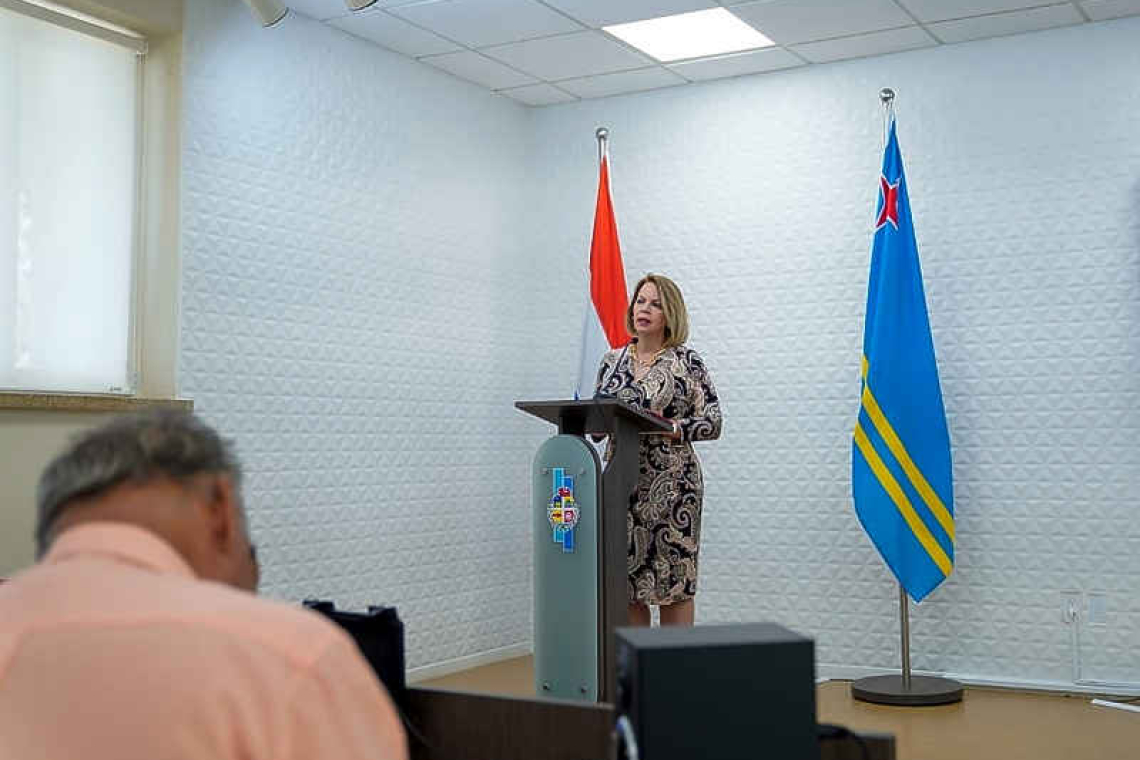Aruba Prime Minister Evelyn Wever-Croes during a press conference on Thursday confirmed that on April 4, the prime ministers of the Dutch Caribbean countries will be in The Hague for the signing of the mutual regulation. (Aruba government photo)
THE HAGUE--The prime ministers of Aruba, Curaçao and St. Maarten will be in The Hague early next week for consultations and the signing of the mutual regulation that will replace the Kingdom Consensus Law Caribbean Body for Reform and Development COHO.
Prime Ministers Silveria Jacobs of St. Maarten, Gilmar Pisas of Curaçao and Evelyn Wever-Croes of Aruba, together with Dutch State Secretary for Kingdom Relations and Digitalisation Alexandra van Huffelen will sign the joint mutual regulation (“onderlinge regeling”)
So far, no details were given about the content of this pending agreement. However, Wever-Croes of Aruba did provide information about the matter during a press conference in Oranjestad on Thursday. Two days earlier, on Tuesday, Wever-Croes provided an update to the Parliament of Aruba.
She divulged that the Dutch Caribbean countries were at a point of reaching an agreement with the Netherlands about the mutual regulation, that the signing was expected to take place in The Hague next week Tuesday and that the COHO was definitely off the table.
Wever-Croes gave a detailed description of the developments leading up to the idea of establishing the COHO. She mentioned the dire financial situation as a result of the COVID-19 pandemic and urgent need for liquidity support. Aruba had to turn to the Netherlands for assistance.
The Dutch government was willing to assist, but it set a number of conditions, she explained. Most of these conditions also applied for Curaçao and St. Maarten which too had asked the Netherlands for financial support because their main revenue stream, tourism, had come to a complete standstill with the border closed.
“We were left with no choice than to accept the conditions,” said Wever-Croes. For Aruba, this meant accepting the COHO and the Kingdom Law Financial Supervision for Aruba, the RAFT. Both would be secured in a Kingdom consensus law. Aruba accepted the terms and received in total 916 million Aruban florins in zero-per cent loans.
Wever-Croes said that for Aruba the required reforms were not a big problem, because Aruba had already indicated that it wanted to work on a number of areas in order for the country to become stronger. “For the Netherlands, the format in which to secure this was important. This is where the theme of COHO came about.”
According to the original plan, the COHO would consist of a board with three persons who would guide the implementation of the reforms. Wever-Croes said that these persons would not be accountable to neither the Aruba government nor the Dutch government.
“The COHO would be a body with three persons appointed by the Netherlands to decide policy. We had a problem with the way this was put, because we can’t leave such important decisions up to three persons who we didn’t appoint, on whom we nor anyone else would have any influence on and who would be accountable to no one,” she said.
Curaçao and St. Maarten had similar objections, and together the three Dutch Caribbean countries decided to come with an alternative, a mutual regulation that is based on article 38, clause 1 of the Kingdom Charter that mentions mutual assistance, consultation and cooperation among the countries of the Kingdom.
In June last year, the prime ministers of Aruba, Curaçao and St. Maarten met with State Secretary Van Huffelen to negotiate. It was there that Aruba presented the alternative of a mutual regulation. Wever-Croes said that this alternative entailed a much more balanced way to execute the reforms.
Curaçao and St. Maarten supported the proposal and it was agreed that the idea would be further worked out.
In January this year, the four countries of the Kingdom again met, this time in St. Maarten. There it was agreed that the mutual regulation would become the alternative for the COHO and that consultations would start shortly on the details of this regulation.
“We are finalising the details and the COHO where three persons would take the decisions is gone. She noted that in its place will come a mutual regulation, a system whereby Aruba and the other Dutch Caribbean countries and the prime minister will be in charge of the reforms.
The prime ministers will report to their parliaments and the Minister of Home Affairs and Kingdom Relations in the Netherlands to the Dutch Parliament. Every country will work with a team that will carry out the activities of the country packages and the reforms. Collaboration will be key in this process, said Wever-Croes.
“The Aruba government has plans as to what we want to do and how we will implement the reforms. The Netherlands has committed to make funding available to execute these plans. We are now close to the mutual regulation, which we expect to sign on April 4,” said Wever-Croes.







